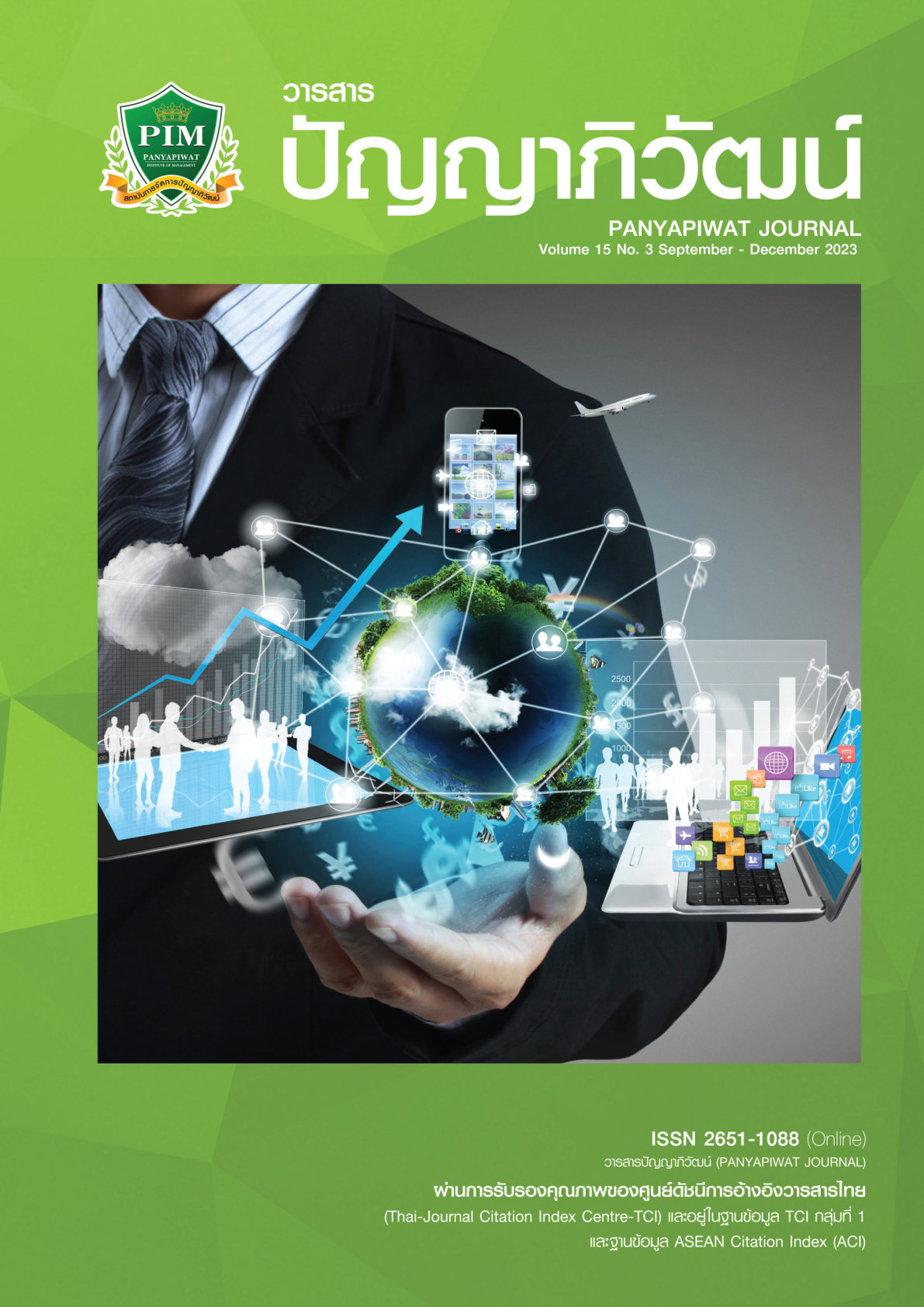การพัฒนาหลักสูตรอบรมเชิงปฏิบัติการเพื่อส่งเสริมความสามารถการออกแบบ การเรียนรู้เชิงรุกตามแนวคิดการเรียนรู้โดยใช้ความท้าทายเป็นฐาน ร่วมกับแนวคิดเกมมิฟิเคชัน สำหรับนักศึกษาวิชาชีพครู
Main Article Content
บทคัดย่อ
การวิจัยนี้มีวัตถุประสงค์หลักเพื่อพัฒนาและศึกษาประสิทธิผลการใช้หลักสูตรอบรมเชิงปฏิบัติการเพื่อส่งเสริมความสามารถการออกแบบการเรียนรู้เชิงรุกตามแนวคิดการเรียนรู้โดยใช้ความท้าทายเป็นฐานร่วมกับแนวคิดเกมมิพิเคชัน สำหรับนักศึกษาวิชาชีพครู วิธีการวิจัยแบ่งออกเป็น 2 ระยะ คือ ระยะที่ 1 การพัฒนาหลักสูตรอบรมเชิงปฏิบัติการฯ และระยะที่ 2 การศึกษาประสิทธิผลของหลักสูตรอบรมเชิงปฏิบัติการฯ กลุ่มตัวอย่าง ที่ใช้ในการทดลองคือ นักศึกษาวิชาชีพครู จำนวน 18 คน โดยวิธีการเลือกแบบเจาะจง เครื่องมือที่ใช้ในการเก็บรวบรวมข้อมูล ได้แก่ แบบวัดความรู้การจัดการเรียนรู้เชิงรุก แบบประเมินความสามารถการออกแบบการเรียนรู้เชิงรุกผ่านภาระงาน แบบประเมินความพึงพอใจที่มีต่อหลักสูตรอบรมเชิงปฏิบัติการฯ แบบบันทึกระหว่างการทดลอง และแบบสัมภาษณ์ผู้เกี่ยวข้อง ดำเนินการวิเคราะห์ข้อมูลเชิงคุณภาพ โดยการวิเคราะห์เนื้อหา (Content Analysis) และการวิเคราะห์เชิงปริมาณโดยใช้สถิติเชิงพรรณนา และสถิติทดสอบ Wilcoxon signed-rank test
ผลการวิจัยพบว่า หลักสูตรอบรมเชิงปฏิบัติการเพื่อส่งเสริมความสามารถการออกแบบการเรียนรู้เชิงรุกตามแนวคิดการเรียนรู้โดยใช้ความท้าทายเป็นฐานร่วมกับแนวคิดเกมมิฟิเคชัน สำหรับนักศึกษาวิชาชีพครูที่พัฒนาขึ้นประกอบด้วย 7 องค์ประกอบ ได้แก่ 1) หลักการของหลักสูตร 2) จุดมุ่งหมายของหลักสูตร 3) เนื้อหาและโครงสร้างหลักสูตร 4) ระยะเวลาของหลักสูตร 5) ขั้นตอนกิจกรรมการเรียนรู้ของหลักสูตร 6) สื่อการเรียนรู้ของหลักสูตร และ 7) การวัดและประเมินผลของหลักสูตร โดยในองค์ประกอบที่ 5 ขั้นตอน กิจกรรมการเรียนรู้ของหลักสูตร ประกอบด้วย 5 ขั้นตอนในการดำเนินกิจกรรม คือ ขั้นที่ 1 คำถามประลองคิด ขั้นที่ 2 พิชิตความท้าทายผ่านปัญหา ขั้นที่ 3 นำพาสู่ภารกิจ ขั้นที่ 4 กระชับมิตรสะท้อนการปฏิบัติ และ ขั้นที่ 5 จัดระเบียบความรู้สู่การนำไปใช้ ผลการตรวจสอบคุณภาพของหลักสูตรโดยผู้เชี่ยวชาญพบว่า ภาพรวมความเหมาะสมของหลักสูตรอยู่ในระดับมากที่สุด (x̄ = 4.60, S.D. = 0.52) และผลการประเมินความสอดคล้ององค์ประกอบของหลักสูตรอยู่ระหว่าง 0.78-1.00
ผลการศึกษาประสิทธิผลของหลักสูตรอบรมเชิงปฏิบัติการฯ พบว่า ผลการเปรียบเทียบคะแนนความรู้การจัดการเรียนเชิงรุกของผู้เข้าอบรมหลังการอบรมสูงกว่าก่อนการอบรมอย่างมีนัยสำคัญทางสถิติที่ระดับ .01 และผลการประเมินความสามารถการออกแบบการเรียนรู้เชิงรุกสูงกว่าเกณฑ์ที่กำหนดร้อยละ 70 โดยมีค่าเฉลี่ยอยู่ที่ร้อยละ 78.05 รวมถึงผู้เข้าอบรมมีความพึงพอใจต่อหลักสูตรโดยภาพรวมอยู่ในระดับมากที่สุด (x̄ = 4.72, S.D. = 0.25)
Article Details

อนุญาตภายใต้เงื่อนไข Creative Commons Attribution-NonCommercial-NoDerivatives 4.0 International License.
“ข้าพเจ้าและผู้เขียนร่วม (ถ้ามี) ขอรับรองว่า บทความที่เสนอมานี้ยังไม่เคยได้รับการตีพิมพ์และไม่ได้อยู่ระหว่างกระบวนการพิจารณาลงตีพิมพ์ในวารสารหรือแหล่งเผยแพร่อื่นใด ข้าพเจ้าและผู้เขียนร่วมยอมรับหลักเกณฑ์การพิจารณาต้นฉบับ ทั้งยินยอมให้กองบรรณาธิการมีสิทธิ์พิจารณาและตรวจแก้ต้นฉบับได้ตามที่เห็นสมควร พร้อมนี้ขอมอบลิขสิทธิ์บทความที่ได้รับการตีพิมพ์ให้แก่สถาบันการจัดการปัญญาภิวัฒน์หากมีการฟ้องร้องเรื่องการละเมิดลิขสิทธิ์เกี่ยวกับภาพ กราฟ ข้อความส่วนใดส่วนหนึ่งและ/หรือข้อคิดเห็นที่ปรากฏในบทความข้าพเจ้าและผู้เขียนร่วมยินยอมรับผิดชอบแต่เพียงฝ่ายเดียว”
เอกสารอ้างอิง
Apple, I. (2011). Challenge-based learning: Take action and make a difference. Apple, Inc.
Buasri, T. (1999). Curriculum theory, curriculum design and development (2nd ed.). Pattanasuksa. [in Thai]
Johnson, L. F., Smith, R. S., Smythe, J. T., & Vron, R. K. (2009). Challenge-based Learning: An approach for our time. The New Media Consortium.
Kaewurai, W. (2021). Curriculum development theory to practice. Naresuan University Publishing House. [in Thai]
Kapp, M. K. (2012). The gamification of learning and instruction: Game-based methods and strategies for training and education. John Wiley & Sons.
Lee, J. & Hammer, J. (2011). Gamification in education: What, how, why Bother? Academic Exchange Quarterly, 15(2), 1-5.
Lee, Y., Hsieh, Y., & Ma, C. (2011). A model of organizational employee’s learning systems acceptance. Knowledge-based Systems, 24(3), 355-366.
Meesook, C. (2015). The learning activities to enhance student engagement by applying gamification technique on information and communication technology course for enrichment science class students Mathayomsueksa IV Anukoolnaree School. [Master’s thesis]. Rajabhat Mahasarakham University. [in Thai]
Ministry of Education. (2013). Development of characteristics assessment tools for teachers and dducational supervisor curriculum. The Agricultural Co-operative Federation of Thailand, Ltd. Publishing. [in Thai]
Ministry of Education. (2017). Assessment for Learning: questions and feedback to promote learning. The Agricultural Co-operative Federation of Thailand, Ltd. Publishing. [in Thai]
Ministry of Education. (2019). Supervision guidelines for developing and promoting active learning in accordance with the policy of reducing study time and increasing learning time. The Agricultural Co-operative Federation of Thailand, Ltd.
Nichols, M., Cator, K., & Torres, M. (2016). Challenge based learner user guide. Digital Promise.
Oliva, P. F. (2009). Developing the curriculum (7th ed.). Allyn and Bacon.
Piyasatit, P. (2022). Teachers’ leadership affecting teaching efficiency of Chinese language teachers in secondary schools. Journal of Suvarnabhumi Institute of Technology, 8(1), 168-185. [in Thai]
Pruettikul, S. (2012). Quality of students derived from active learning process. Journal of Educational Administration Burapa University, 6(2), 1-13.
Sinlarat, P. (2019). Curriculum management and teaching (5th ed.). Chulalongkorn Publishing. [in Thai]
Srisa-ard, B. (2010). Basic research (8th ed.). Suviriyasarn. [in Thai]
Suttirat, C. (2014). Curriculum development theory to practice (2nd ed.). V Print (1991). [in Thai]
Suwannarusk, P. (2020). The development of online training using coaching technique to enhance instructional design ability case study of graduate students of Silpakorn University [Master’s thesis]. Silpakorn University. [in Thai]
Taba, H. (1962). Curriculum development: Theory and practice. Brace & World.
Tonghom, J., Sripahol, S., Patphol, M., & Wannapiroon, P. (2017). Develop of online curriculum to enhance creative innovation skills. E-Journal Silpakorn University, 10(2), 138-156. [in Thai]
Trakulkasemsuk, P. (2016). Gamification in the classroom: The application of using video game technique in class to develop students’ class attendance, participation and scores. The 13th Hatyai National and International Conference (pp. 180-192). https://www.hu.ac.th/conference/conference2016/proceedings/data [in Thai]
Tyler, R. W. (1949). Basic principles of curriculum and instruction. University of Chicago Press.
Utranan, S. (2012). Basic principles and curriculum development. Mitrasiam. [in Thai]
Wallace, S. (2015). A dictionary of education (2nd ed.). Oxford University Press.
Wongyai, P., & Phatphol, M. (2020). Instructional design in new normal. Graduate School of Srinakharinwirot University. [in Thai]


